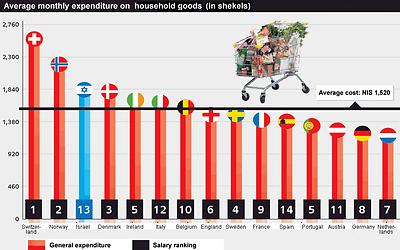Israeli prices still remain high relative to Europe
“Consumers have become much more sensitive to food prices, a phenomenon economists call demand elasticity, which probably contributed to the decline in food prices. For example, research has shown that the 2011 protests led to increased elasticity in demand for cottage cheese, which helped bring down its price,” the report said.
Food prices exceed the overall rate of inflation in the decade by 11.9%. During most of that time, food prices rose more quickly than housing prices, which received far more attention from the government and media: Before they began to fall last year, food prices had climbed 13.4% after inflation since 2005, while housing costs rose 12.3%, the center said.
Israeli food price also rose faster than their European counterparts. Adjusting for the difference in how the European Union countries measure a basket of food items, Israeli food prices rose 35.3% between April 2005 and April 2015, compared with 25.7% for EU countries. Figures from the Knesset center showed that only since 2013 has the trend shifted, with Israeli prices down 2.9%, versus no change for the EU.
After discounting for local inflation, Israeli food prices rose the sixth fastest among 32 countries surveyed by the center – 11.8%, compared with an average of 4.6% for EU countries.
Ora Coren

